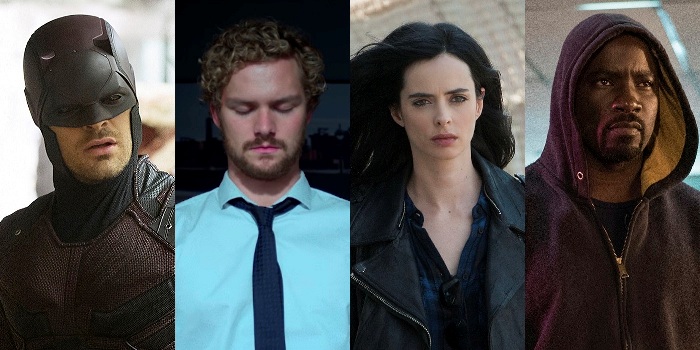
Daredevil Season 1 
Daredevil Season 2 
Jessica Jones 
Luke Cage 
Iron Fist 
Marvel’s MCU films are the most successful film series of all time. Each has been clever and exciting, with a touch of theme and a whole lot of character, while also allowing Mickey Mouse to dance around his new pools of money.
The related MCU “TV” series are a different matter and have had some success, but not the same level. Of the six, four stream on Netflix and are close kin. Agents of Shield and Agent Carter are different, and so should be looked at separately. But the other four, those can be evaluated together as they have many of the same traits.
Creating series for streaming, and for a lot less money than the films, allowed Marvel to do something different. This is usually described as “making entertainment for adults.” That doesn’t mean adult with regard to sex or violence, although they have a touch of both. And it certainly doesn’t mean with regard to plot. It is theme where things are different. Each show could examine socially troubling issues. This is most visible with Jessica Jones which delves into domestic and sexual abuse, and Luke Cage which looks at Black culture and racism. In all cases, theme and character take precedence over plot. It is the themes that make these shows worth the time.
All of the shows involve “street-level heroes,” superheroes with fewer powers than The Avengers and mostly lacking the preternatural skill sets. They do not face cosmic threats, but fight street crime and mob bosses. Their stories are focused on smaller areas and smaller events, and on the day-to-day trials of normal life. And happiness seems out of reach. There are no great celebrations. If they fail, things are bad. If they succeed, then things are a bit better, but still not great. These are not happy stories. With considerably smaller budgets than for a single MCU feature, there’s no big action scenes or wild CGI.
Beyond theme, the shows focus on tense situations and character. Unfortunately, the second part of that doesn’t work so well. The shows have plenty of time to look at the characters, but that doesn’t mean they use it well. Instead of delving into these characters, more often, the extra time is spent on speeches or revisiting the same thing over and over. It may be true that in reality people dwell on the same thing repeatedly, but that doesn’t make it good storytelling. In every case, the shows are too long. Running thirteen episodes, none of them should have been over ten, with six to eight being preferable. The plots do not require this much time to unfold. Often, to stretch out stories, characters make incredibly stupid decisions that not only slow things down, but make it harder to like them or believe them as characters. It doesn’t help that most scenes are too loosely edited. They drag. All five season (Daredevil has two seasons) would be improved greatly by tighter editing throughout, and the paring away of irrelevancies and excessive speeches. Cut them down to eight eps, and these would be gold. At thirteen, it is a matter of sorting the good from the bad. The good won out at the beginning, but as time has passed, the weaknesses are winning.
Daredevil: Season 1 
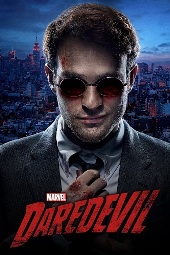
Matt Murdock (Charlie Cox) is a blind lawyer by day and an enhanced vigilante by night. In his law practice, formed with his college friend “Froggy” (Elden Henson) and aided by recent client Karen Page (Deborah Ann Woll), he defends the poor. As “The Devil of Hell’s Kitchen” he attempts to take down the mobs, searching for the kingpin of crime, Wilson Fisk (Vincent D’Onofrio). Fisk, a violent and driven man, plans to remake the city into something beautiful. His life is altered when he unexpectedly finds himself in love with art-dealer Vanessa (Ayelet Zurer).
Daredevil: Season One is the highpoint of the MCU on Netflix. It is written better, with wittier dialog, and shot better than the rest. It is serious, but not too serious. The fights are brutal but they are secondary. Much more time is spent on getting to know Matt Murdock and his pals than anything else.
It has the same flaws as the others, but to a lesser extent. I’d like to edit it down, and remove the most ridiculous decisions (You mean the guy that kills people who cross him might try to kill you if you cross him? Shocking). And there’s too many speeches and lots of repetition on the nature of a hero and vigilantism.
Matt Murdock is a middle of the road character, neither interesting nor annoying. And Froggy, the sidekick, is just that, a sidekick who fills up time. Then there is Karen Page, who’s like something out of the 1950s. She never thinks; she simply emotes. In this (and the second season) she just jumps in, crying about truth and how sad things are with no regard to how anything works and we are supposed to ride along. Bringing up THE TRUTH in a court case is not important if it is clearly inadmissible or irrelevant. She’s a bad trope from an earlier time.
What the season has is a great villain in Wilson Fisk, and most reviews fawn on him. People mistakenly think it is Fisk alone, the performance by Vincent D’Onofrio and his being a villain who is fighting for what he thinks is good. But it is the relationship between him and Vanessa that makes the show work. When Fisk kills the Russian boss, it isn’t for some empty scheme or due to daddy issues (see Luke Cage). It is because the Russian damaged his relationship—because Fisk was embarrassed in front of Venessa. That made it emotional. That gave it resonance. I believe everything Fisk does connected to her. And I believe her. They are the heart of the show. At times I wanted him to win. I understood him. I almost liked him, but I really liked them together. D’Onofrio may have been excellent, but Zurer is more. Hers is the finest performance in any of the series.
To add to a great villainous couple, we have a great henchmen in loyal James Wesley (Toby Leonard Moore). I could have watched thirteen episodes of the adventures of Fisk, Vanessa, and Wesley.
Daredevil: Season 2 
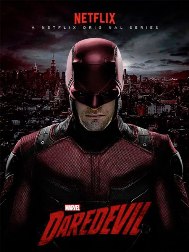
Frank Castle (Jon Bernthal), The Punisher, is a new vigilante in town, who has no problem killing. Daredevil decides he must take him down while Karen feels there is more to his story that needs to be revealed. Simultaneously, Matt Murdock’s old love, Elektra Notchios (Elodie Yung) has returned to town, her appearance corresponding to an increase in crime by a mysterious organization of ninjas known as The Hand.
Season 2 differed from the other 4 seasons of MCU Netflix series by theoretically having enough story to fill thirteen episodes, but only because it ran two completely disconnected, simultaneous plots. They not only didn’t fit together, they didn’t match in tone or theme. It made for a jangling viewing experience. The Punisher stuff is down to earth, violent, and supposedly emotional. The Hand subplot is pure fantasy, filled with vague mystical ramblings and superhero hijacks.
While the two stories could have filled thirteen episodes with plot, they didn’t. Neither story was fleshed out or even finished. The Punisher plot is very simple. The big bad was barely developed and his scheme seemed to be nothing more than heroine smuggling (at one point the big bad says it is more, but nothing more is given). It is a revenge story for a family we don’t know taken on bad guys who are never explained.
The second is even more undeveloped. It is vaguely about The Hand and their quest for their ultimate weapon. It’s filled with a fair amount of esoteric mumbo-jumbo: fate, immortality, ancient magic, and rising from the dead. But none of that goes anywhere. The great war, which we are told is very important, is kept ambiguous. The ultimate weapon is not explained at all. The bad guys are mostly unidentified. There are no stakes and no emotion.
So while there was enough story, they didn’t tell those stories. Instead, we again are given speeches, very slow cuts, and prolonged shots of nothing in particular. And of course, we get the same, uninteresting and done-to-death debate on superhero morality: Is killing ever allowed, and if one kills, then has he “crossed the line” from which he can never “return”? It’s tedious. A good theme could have obfuscated the glaring plot holes, but we didn’t get one.
Season 2 made it clear that Matt Murdock is not the draw. Daredevil just isn’t a great character. He is neither engaging nor likable. It isn’t a matter of him being too straight-laced or too obnoxious. Captain America is good and very likable. And Tony Stark is an ass, but also likeable. Matt Murdock sits in the uninteresting spot between them. Neither his endless moralizing, nor his slips from that morality, make him relatable, or cool. I never empathized with him. And without Fisk and Vanessa, there’s no magic.
Jessica Jones 
Jessica Jones (Krysten Ritter) had retired from the superhero business to become a drunken private detective, though her main focus is personal: stop Kilgrave (David Tennant), a mind-controlling super villain who had kidnapped her and held her for months. Her plans are altered when Kilgrave forces his latest victim, Hope (Erin Moriarty) to kill her parents. Jones feels the need to prove Hope’s innocence which means capturing Kilgrave alive. She is aided by radio personality Trish Walker (Rachael Taylor) and by Will Simpson (Wil Traval), a police officer with rage issues.
Where in the other series, theme is the most important factor, in Jessica Jones it buries everything else. This is a thirteen hour examination of abuse. Mainly it is sexual and domestic abuse. With only the slightest of exceptions, everyone is either an abuser or abused, and most are both. Jones is a rape survivor, both literally and metaphorically. Her rapist, Kilgrave, was a child-abuse victim. So was Jessica’s best friend, Trish, who also is assaulted during the series. The guy who attacks her, Will Simpson, is a metaphoric rape victim and was abused by his doctors as well as suffering from PTSD. Jessica’s lawyer (Carrie-Anne Moss) is the abuser of two domestic partners. And that’s not nearly the end. This is a parade of suffering people.
But the show isn’t about the abuse. It is about the effects of abuse. It is about recovery, or the lack there of. It is about how people deal with abuse. It’s about their fear. How they hide. How they become alcoholics and drug addicts. How it stays with them forever even if they can move on. And it is very emotional stuff. I don’t think it has been done better.
Unfortunately, the plot is less interesting. It’s not that it is bad, perhaps being the best of the Netflix MCU stories; it is just slight. The basic plot could have been covered in two episodes. Kilgrave just wants to have a good time and desires for Jessica to be at his side. Jessica want to stop Kilgrave and free a girl whose been accused of one of his crimes. That’s it. Adding in the soldier with rage issues and Luke Cage should have required another hour. There’s not nearly enough story for thirteen episodes. Even slowing things down for mood and in-depth character examinations, Jessica Jones should have been six episodes, eight if they were pushing it. But never thirteen.
Like in Daredevil, the series is extended by having Jessica and company make stupid decisions, and they do. Very stupid. It is more excusable here than in the other series because all of the people are broken and making horrible decisions in general. But it isn’t excusable enough. It gets annoying. We, as viewers, are so far ahead of the characters.
So Jessica Jones is far too slow for multiple reasons. The dialog is OK, but nothing special. The plot is simplistic and it is hard to like these folks (sympathize with—yes, but not like). But the ever-present theme distracts from the many problems. And that theme is important, so I can let the show slide here and there. But that makes this a series to respect, not enjoy.
Luke Cage 
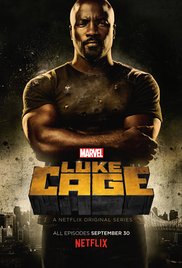
Luke Cage (Mike Colter) is on the run, keeping his head down in Harlem, but when a friend is killed, he feels he must get involved. Cottonmouth (Mahershala Ali) rules the criminal underground from his music club and he… Wait. Wait. Scratch that. After getting to know Cottonmouth really well, it turns out he doesn’t count. OK, lets try that again. Corrupt politician Mariah Dillard (Alfre Woodard) has plans to rebuild Harlem her way and doesn’t care who gets hurt along the way. She… Damn. Wait. That’s wrong again. We just spent a lot of time with her but she’s a sidekick. Let’s try this one more time. Over-the-top, comic book villain, Diamondback (Erik LaRay Harvey) eventually shows up with some plan to sell weapons that I sure don’t care about. He also wants to hurt Luke Cage and just run around and be crazy. Yup, he’s the guy they settled with. For their gritty realistic show…Diamondback. The guy with less subtlety than Ronan. OK. Anyway, Luke has to stop him.
I’d like to say that representation isn’t the only important thing about Luke Cage, but it is. The superhero genre is very White. Asians hardly exist and (discounting Steel, as one should) the only Blacks are a couple of sidekicks. So finally we get representation for Black characters and Black culture and it is welcome. Just as story is secondary to showing what abuse is like in Jessica Jones, so story is secondary to Black representation in Luke Cage.
Cage himself is less engaging than he was as a secondary character in Jessica Jones, but that is the fate of the MCU Netflix lead. As a lead he’s now the guy who makes speeches. Lots of time is spent with him but little of it brings up anything new. He repeats himself. We see him doing what he has done before, just a lot more of it. In Jessica Jones, Cage was defined by his loss, by the death of his wife. Here he’s defined by a never-ending debate on the responsibilities of a hero. To slow down the series—and like its predecessors, it moves slowly—Cage spends a good deal of the show changing his mind on if he will fight or run.
I applaud the nods to old blaxploitation cinema. I wouldn’t be surprised if most of those watching miss that—you have to be a fan of the old films. But someone involved in making the show sure knew those films. The music is reminiscent of the past, as are many of the background characters, and shots. We even see Cage in his old blaxploitation costume from the comics, although that lasts only a moment.
Once we get past the diversity and Black culture, we are stuck with the plot and it is, like that of the others, not that interesting. There’s enough for four episodes, maybe more, but nowhere near thirteen. The story is far too predictable. We know who’s going to die before they do, and what that death will motivate. We know who will be a traitor—the same person in every other series and movie. We know how everyone will react.
The only surprise is the swapping of villains, and it isn’t a welcome one. The three villains are connected by a henchman, which is just the start of a string of coincidences. Cottonmouth is a red herring villain. At least he is fully realized, even if it doesn’t matter and he comes to nothing. Dillard is a corrupt politician and her scenes during the protracted time when Cage is missing belong in the TV show Scandal and as far away from a superhero show as possible. The third is Diamondback, a crazy guy who acts crazy just to be crazy. Worse—far, far worse—he is coincidentally connected to Cage in a way that reminds me of the worst excesses of Bond’s Spectre. I guess everyone in Georgia ends up in Harlem at some point. The show runs on coincidences. The main henchman just happens to have been in prison with Cage, and happens to have beat him, and happens to have been involved in a secret fight ring with him.
By the end, stupid is ruling everything. One gang decides to hit the big bad, but instead of just shooting, as might happen in the supposedly real world the show pretends to be showing, they monologue. No one is making decisions that approach reality, or sense, or are in any way interesting.
This is a series with a point that matters containing a story that does not matter. Who cares if Luke wins or loses? If Dillard wins it probably is better for Harlem then if she loses. If Cottonmouth had won, well, things would have been about the same, though with less street violence. And Diamondback’s plans pretty much just involve Luke Cage. I suppose the point is displayed there: For Blacks in the city—in America—all the fights and crime change nothing. The police are not your friends. The system is not your friend. White America is not your friend. That’s an important theme, but one that’s hard to make into an interesting story, and Luke Cage doesn’t manage it.
It’s not all bad and I might sound harsh, but mainly because so many are overlooking the show’s many, many problems. Mike Colter is handsome and charismatic. Claire Temple (Rosario Dawson), who is in all four shows, is at her best here. Shades (Theo Rossi), the henchman, is fun and pulled me in whenever he popped up. He’s evil, but somehow he is also likable, which is true of all the best villains. There’s a few nice Black power moments. Method Man’s radio interview is memorable and gets to the heart of the show: a bulletproof Black man.
As for the climax, it is best to forget it.
Luke Cage, like Jessica Jones before it, gets many accolades for doing what other shows haven’t, and should have. But due to that, no one seems to be talking about if it is actually good at what it is doing. Well, when you are starving, then bread and water is a feast. When pop culture is where it should be with regard to race, Luke Cage will be seen as tasteless and chewy, but for the moment, it’s a feast.
Iron Fist 
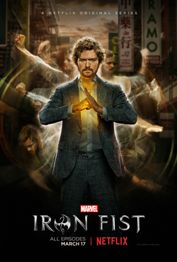
Naïve and kindly, but also bratty, Danny Rand (Finn Jones) returns to New York after having been declared dead years ago in a plane crash. He’d been rescued by monks and trained to be a warrior, eventually picking up the magical power of the “Iron Fist.” He is now the defender of the monastery from The Hand, but he left because he felt unsatisfied. His father’s multi-billion dollar company is now run by Joy Meachum (Jessica Stroup), a childhood friend, and Ward Meachum (Tom Pelphrey), a childhood bully who hasn’t improved. Unknown to most, their father, Harold Meachum (David Wenham), who died and was resurrected by The Hand, is pulling the corporate strings behind the scenes. While Danny slowly—oh, so slowly—proves who he is, he gets involved with martial arts instructor Colleen Wing (Jessica Henwick) who has her own secrets; this allows for Danny to spout off all kinds of Asian phrases to the Asian girl, making Danny look like douche bag of the year—although apparently we aren’t supposed to think that.
Remember the Phantom Menace? Remember how you asked for a new Star Wars movie that would emphasize trade negotiations? You don’t remember that? Yeah, that’s because it never happened. How about when you asked for a comic book martial arts film that would really focus on corporate legal arguments? Didn’t ask for that either? No one did.
So, we bring the MCU not down to street level, but to the most boring penthouse you can imagine. There’s legal wrangling as we watch Danny Rand ineffectually argue that he is the supposedly dead son of a billionaire. Like the other Netflix shows, Iron Fist forgets that it isn’t interesting for us to be ahead of the characters. We know the lead character is Danny, so waiting for everyone else to get up to speed just uses up time. That time could have been spent working out who these characters are and what makes them tick. But Iron Fist prefers the simple approach. How do we know that corporate asshole is an asshole? Show him cheating at Monopoly as a kid and yelling that “rules are for pussies.” This is not a nuanced show.
While Iron Fist is supposedly of a more adult nature then average programming, watching it felt like watching a kid’s show. Danny is an emotionally unstable ten-year-old. Sure, spending years in a monastery could leave him naïve, but he’s a spoiled child. And everyone interacts like children. Ward functions purely as a bully kid. Claire Temple, now in every show, gives us first grade morality (killing is bad!). Gee, thanks. Characters get very upset if they aren’t getting enough attention. The whole show would make sense if these were a group of children just reaching puberty. A substantial part of the back end of the series is about Danny throwing a tantrum. We’re supposed to take it as a combination of PTSD and moral evaluation, but it’s just a tantrum.
Iron Fist has the slowest start of any of the series. The first eight episodes crawl, with little of interest happening. Things pick up in episode 9 (far too late), but it then stumbles again before coming to a remarkably unsatisfying conclusion (Danny is only alive because henchmen seem to not shoot their guns sometimes in the middle of a fight…)
The villains could have elevated things, but they do not live up to their potential. The undying Harold Meachum ends up doing the same sort of corporate bad guy things we’ve seen in dozens of non-superhero films. And the mystery villain that pops up late could have been interesting if it wasn’t clear immediately that he was a villain. I don’t know why “smarmy” was the choice they made. He could have been multifaceted. But nope.
So this time, we have all the expected problems, but they are worse. Iron Fist is slow. The editing is primitive. The plot could fill 6 episodes, not 13. There are speeches and the same subjects keep getting brought up. It is the worst of the shows, so it needed theme to save it like Luke Cage and Jessica Jones. But it doesn’t get it. Instead, theme drags it down. First, its themes are confused. The whole “killing is bad” and “I must get past my anger” puts us squarely back in children’s programming. It dips a finger into currant American culture with the problems of massive corporations and then flops about like a fish. The series takes the stance that big corporations can be mean (edgy there…), but then groups anyone who wants to change the system into The Hand, labeling them as either evil or fools. What does that leave? The big message: Corporations are OK as long as good people run them, even if the good people are stupid (and yeah, Danny is stupid). Gosh, I wonder why no one ever thought of having good people run corporations.
Which brings me to the missing theme. The character of Iron Fist was created to profit from the popularity of Hong Kong martial arts films. But in the early ‘70s, Marvel was far happier to sell another White character then bring in an Asian one as they should have. So they race-swapped an Asian, giving us a White savior. He’s a White kid, but dumped into the mysterious Orient and their inscrutable ways, he becomes better then all the people who live there. Naturally he’s better. He’s White. He tosses around pop culture Asian saying and is the great White martial arts master. This is an old trope, that should have been dumped years ago.
So Marvel had a choice. They could propagate a racist trope from the ‘70s, that’s also a cliché that makes the character less interesting, or they could fix their forty year old mistake. They chose the former. They went with the cliché giving us something duller than it should be, and racist.
Being a racist cliché did not sink Iron Fist. It was already sunk from its plot and editing and childish characters. But, if they’d made the right decision, and made Danny an Asian or an Asian-American (probably the best choice), then we’d have something new for cinematic superheroes. Then we’d have a theme with something to say. And maybe that would have been enough to save the show (as happened to some extent with Luke Cage and Jessica Jones). Doctor Strange suffers from the same racist cliché (though to a much lesser extent), but it had enough else going for it that it didn’t need to be saved. It’s fun, if a touch uncomfortable. Iron Fist has very little going for it. So theme was its one chance, and a racial positive theme dealing with Asian-Americans would have been a game changer.
Instead, Iron Fist has to stand on some other qualities, and it has none that are strong enough to hold it up.
